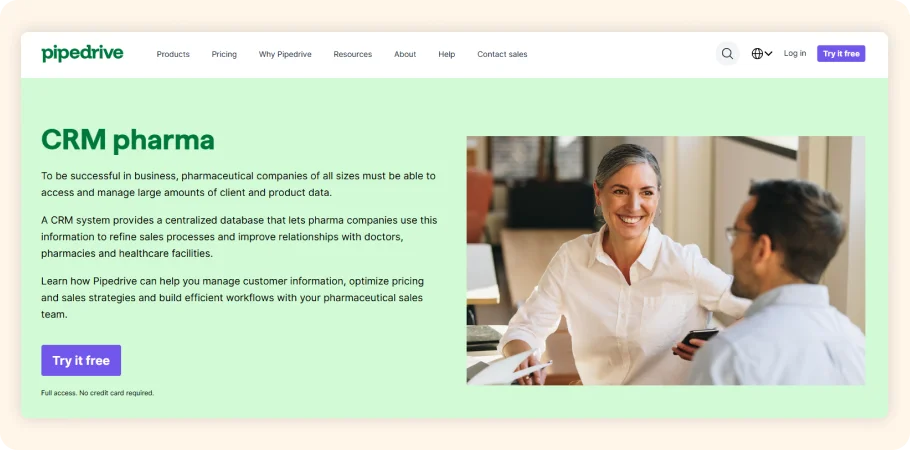If you are looking for CRM for the pharma industry, that fits well with your organization, then match the features first. A start-up or any industry that wants to expand its business, adopt CRM first. It’s not just about optimizing various processes, automation, and AI, but how it can change every segment of the company leading to an increase in efficiency.
There are basically 2 types of Pharma CRM: CRMs designed for B2B often focus on content-centric use cases, while those for B2C prioritize integration with commerce-centric workflows. While there are CRMs that are designed for both types of business.
Ask questions like: How will it help my employees to work accurately? How this CRM will increase sales? Is it really beneficial for my organization or am I just implementing it because my competitors are? Will it comply with the regulatory measures?
Let’s get you through some stats to get better idea:
- The global the pharmaceutical CRM software market was valued at $4,156 million in 2023 and is projected to reach $6,643 million by 2033.
- Approximately 70% of healthcare organizations utilize CRM systems to enhance patient engagement strategies.
- Businesses using CRM systems report a 42% improvement in sales forecast accuracy.
The above numbers for pharma CRM clearly indicate how advanced technology is going to rule this industry. But are you ready for it? It’s not about staying ahead of your competitors only, but how effective your strategies are and if they are aligning with the trends. Choosing the best pharma CRM software for pharmaceutical companies comprises going through many software. I have narrowed down the list to 10.
10 CRM for pharma industry that are going to rule in 2025:
1. CrmOne

Being at the top among the CRM for pharma, CrmOne offers an innovative solution. It has transformed the traditional features and presented in a better way to its clients. Particularly for medical professionals in the pharmaceutical industry, it has designed operations that can improve patient care.
The patient data management feature allows you to securely store and manage all medical records and healthcare data. It puts more effort in prioritizing data security, as a HIPAA-compliant solution provider.
The clinical workflow automation capability lets you bring all the tasks into a single centralized platform. And of course, the user-friendly interface makes it interactive, so you can easily switch between multiple tasks and resumes.
The software reduces the time healthcare providers spend on paperwork, allowing them to focus more on patient care. This automation not only enhances productivity but also helps minimize errors that can occur in manual processes.
One of the major issues in the pharma industry is ‘mismatch’ time that leads to losing of customers. Hence, CrmOne ensures that healthcare providers can manage their daily tasks. It has automation in task management and appointment scheduling.

CrmOne also has great patient communication, and multiple channels to interact with healthcare providers and patients. Automated messaging and follow-up reminders so patients get timely information about their health and treatment plans.
CrmOne has customization options for pharmaceutical companies to tailor the CRM to their needs. From customizable email templates to specific workflow settings, you can adapt the platform to your needs. This way CrmOne can fit into any healthcare practice, from small clinics to big pharmaceutical companies.
Boost Your Business Performance with CrmOne
Our experts will guide you through the most effective ways to use CrmOne, ensuring you fully leverage its features for maximum impact on your business.

2. Zoho

Zoho is a pharmaceutical software that is designed to meet the unique needs of this industry. It has many features that have been proven to be effective in aligning operations and increasing productivity for pharmaceutical products.
One can easily track stock levels, order placement and create invoices, without any human intervention. It brings all the product-related activities to a centralized platform, which is crucial when you are focused on more than one task.
Talking about HIPAA compliance, it has good data security and privacy, so that the industry regulations are met. Get a 360-degree view of customer interactions, to build strong relationships. The interface and features can be tailored to meet the requirements.
It supports Omnichannel communication, so you can interact with healthcare professionals or customers across various platforms. Notify medical reps of upcoming field visits, schedule follow up activities, set reminders, and update customers.These all leads to increase in sales!
3. Veeva

A specialized medical sales software, that has its niche in pharmaceutical and life sciences industries. It offers an all-in-one pharmacy sales and account management solution to maximize sales opportunities. With features like order management and inventory monitoring, it has made a huge impact on its clients.
Sales representatives can capture, price, discount, and process orders directly at the point of sale. This increases product visibility and allows for negotiation with pharmacies. Veeva has claimed that their system enables reps to optimize the order process through pre-loaded discount calculations, which makes it easier to manage multiple products at once.
It offers a cloud-based solution, so teams can have remote access to data. It includes advanced analytics and reporting capabilities, features that help organizations identify KPIs and make decisions based on data. It reduces risks and safeguards against potential violations by offering compliance solutions.
4. Salesforce

Salesforce is one of the leading CRM for the pharma industry, that focuses on customer engagement and aligning processes. It has tools that create a user-friendly environment for communication between pharmaceutical companies and Healthcare professionals.
You can gain insights into customer data and market trends, customize marketing strategies, and improve outreach efforts. It supports multichannel engagement, to connect with customers on various platforms such as email, social media, and other mobile applications.
One of the best features is sales forecast. The automation is strong enough to analyze the data and help you in creating a sales strategy, which is very effective.
The platform includes tools for tracking interactions with HCPs in a compliant manner, ensuring that all communications adhere to legal standards. Salesforce’s Health Cloud further enhances its capabilities by providing a unified view of patient data and facilitating personalized care management.
By integrating various data sources into one platform, Salesforce empowers pharmaceutical companies to make informed decisions that improve patient outcomes and drive business growth.
5. Zendesk

Your search for high-tech software for pharmaceutical ends at Zendesk. It has emerged as a valuable asset for this industry. The user-friendly interface and efficient ticketing system support process play a crucial role. These features are must have in an industry where timely responses to healthcare providers directly impacts patients care.
The mobile app of Zendesk is recommendable. Easy to track all the rep’s activities, notes, and communication, even when you are offline. The email templates, geolocation map displays, etc. make it easy to use.
It integrates easily with other systems that are related to pharmaceutical sector. Ito offers a high degree of customization, that lets you tailor support services to specific needs. However, this feature is also too time consuming in training.
6. Pipedrive

Pipedrive as a CRM for pharma industry is gaining slow and steady recognition. It compromises many advanced features. It has automatic workflows and triggered follow-ups to eliminate manual work.
Just like Salesforce, it has a strong sales forecast, so you can adjust pricing to make it competitive and also change production strategy to achieve sales targets. It offers pharma solutions by having a high degree of customization features. Using this you can create custom modules and standardized processes to adapt to your business needs.
Pipedrive’s visual pipeline feature enables users to see where each lead stands in the sales process at a glance, facilitating better prioritization of tasks and follow-ups. This clarity helps pharmaceutical sales representatives focus on high-potential leads and move them through the pipeline more effectively.
For easy accessibility, if offers a cloud-based mobile app, so your teams can stay connected with each other anytime and anywhere. It helps in delivering personalized and targeted marketing campaigns too. Pipedrive software in pharmaceutical industry analyses buying trends, so you can make decisions that drive sales.
7. HubSpot

Hubspot as a CRM for pharma has not gained that much popularity, though it has more features than typical pharma CRM system offers. You can bring email, text, ad-centric channels, or social media, all into a centralized platform.
Custom objects come with limitations, which is one of the major drawbacks of HubSpot. There is no such thing as affordability with HubSpot pharmaceutical software. Hence, not a good choice for start-ups or capital capital-centric industries.
It has its own CMS and database, hence, it has the advantage of building a custom website. It is designed with a focus on upstream marketing activities, but it may not be the best fit for companies with complex audiences or transactional customer-facing workflows.
8. Kapture

An AI-powered CRM platform for pharma industry that has a great customer experience platform, across every channel. It uses AI and ML both in an articulated way. This platform is different from other CRM software because of its advanced tech features.
Pharmaceutical companies that want their sales and marketing segments to run smoothly can quickly implement this software. From managing various clients, including doctors, retailers, and clinics, it simplifies these processes by automating tasks like sales tracking, ticketing, and field operations.
It empowers managers to assign customer visits and daily tasks to their sales agents through a mobile app. This check-in and check-out feature allows agents to track their movements and activities, to get insights. Also, the geo-location tracking lets supervisors monitor the field team’s activities, so they can engage with HCPs and deliver products.
It has a unified dashboard to give pharmaceutical solutions in the optimum way possible. This approach eliminates the need for agents to switch between multiple applications. You can access client information, purchase history, and payment details.
9. MondayCRM

Monday CRM to gather patient information, so healthcare professionals have one place for all the important data. Contact details, medical history, treatment plans, and appointment schedules.
It has automation capabilities to reduce the administrative burden on healthcare staff. You can automate repetitive tasks like appointment scheduling, follow-up reminders, and patient communication.
Security and regulatory compliance are crucial in healthcare, and Monday CRM has got it covered. It’s HIPAA compliant so your patient data is protected according to the strict regulations. Activating the panic button allows you to momentarily block your account if your team’s login credentials are compromised.
10. Creatio

One of the biggest benefits is campaign management. With Creatio pharma companies can segment HCPs and HCOs and send personalized communications to each segment.
Creatio as a CRM for pharma is great for lead management. The platform automates the entire lead lifecycle from lead capture to handover to sales teams which increases conversions.
By using closed-loop marketing organizations pharmaceutical businesses can refine their messaging based on insights from previous interactions with HCPs.
With territory and contact management tools, sales reps can structure their relationship management their accounts and prioritize their outreach based on geography or product.
Field force management allows for planning and monitoring of sales activities so reps can spend more time with HCPs.
The platform helps organizations navigate complex regulations by automating workflows for safety information management and adverse events monitoring.
Conclusion:
A well-integrated CRM solution not only facilitates personalized communication but also empowers sales and support teams to make data-driven decisions that drive growth and improve patient outcomes. It’s all about how effective your methods are.
Your tactics depend on the features of the CRM you implement. Consult your team members before opting for any CRM solutions. Take a demo and discuss it with them. Understand the scalability factor, and is the software cost-effective.
Get started for Free
Start for free today. Boost your sales by clicking the Get Started button. With CRMOne, you can manage leads, sales, and customer service all in one place.

